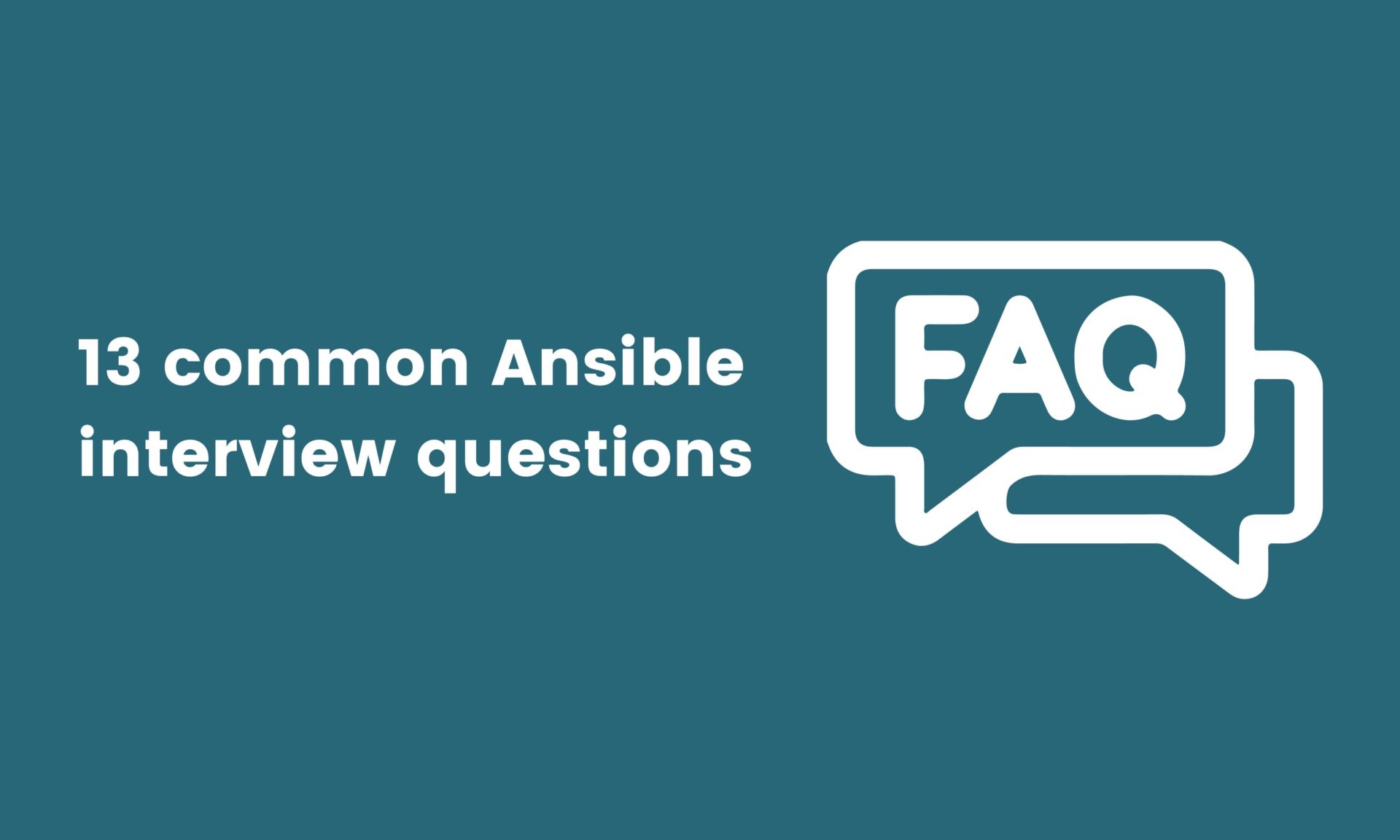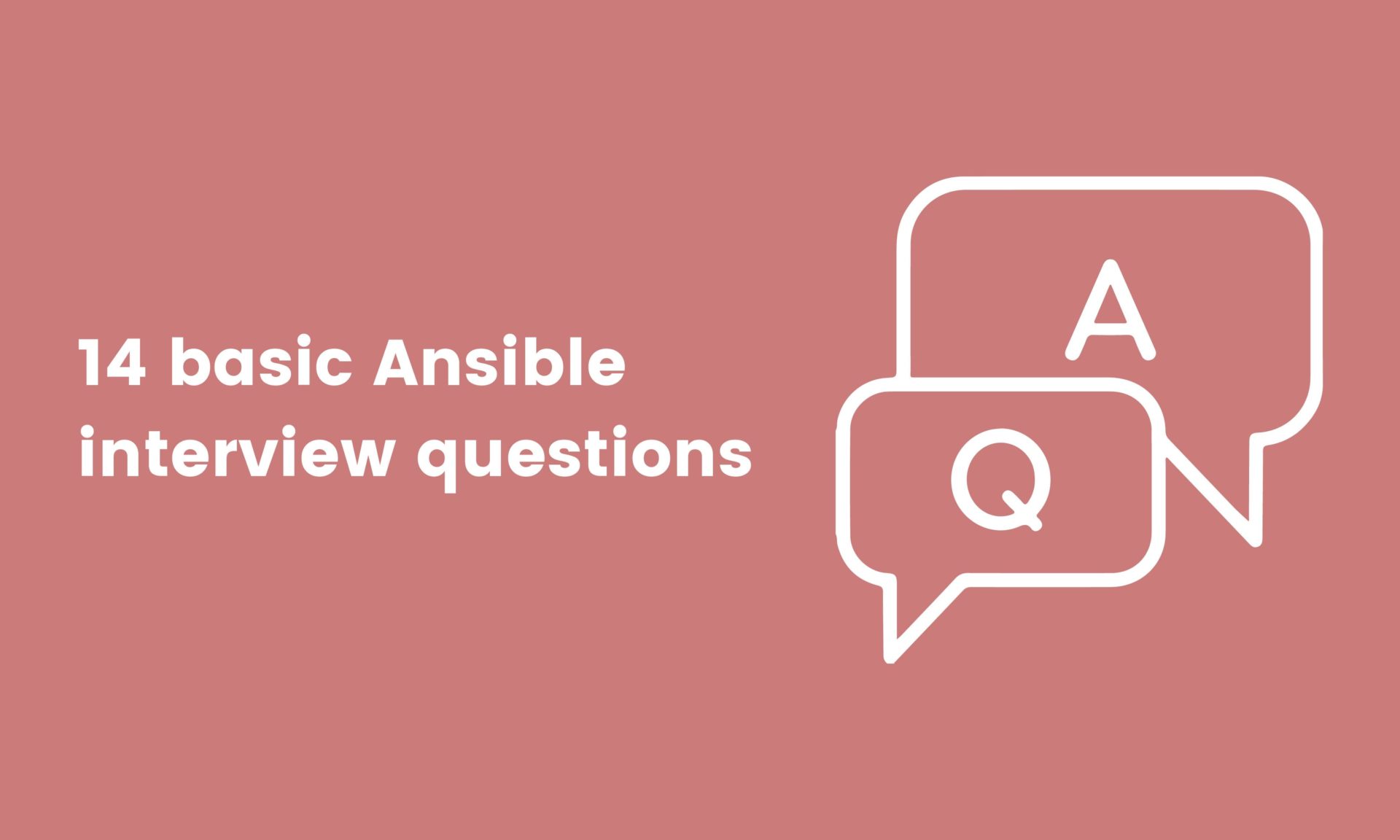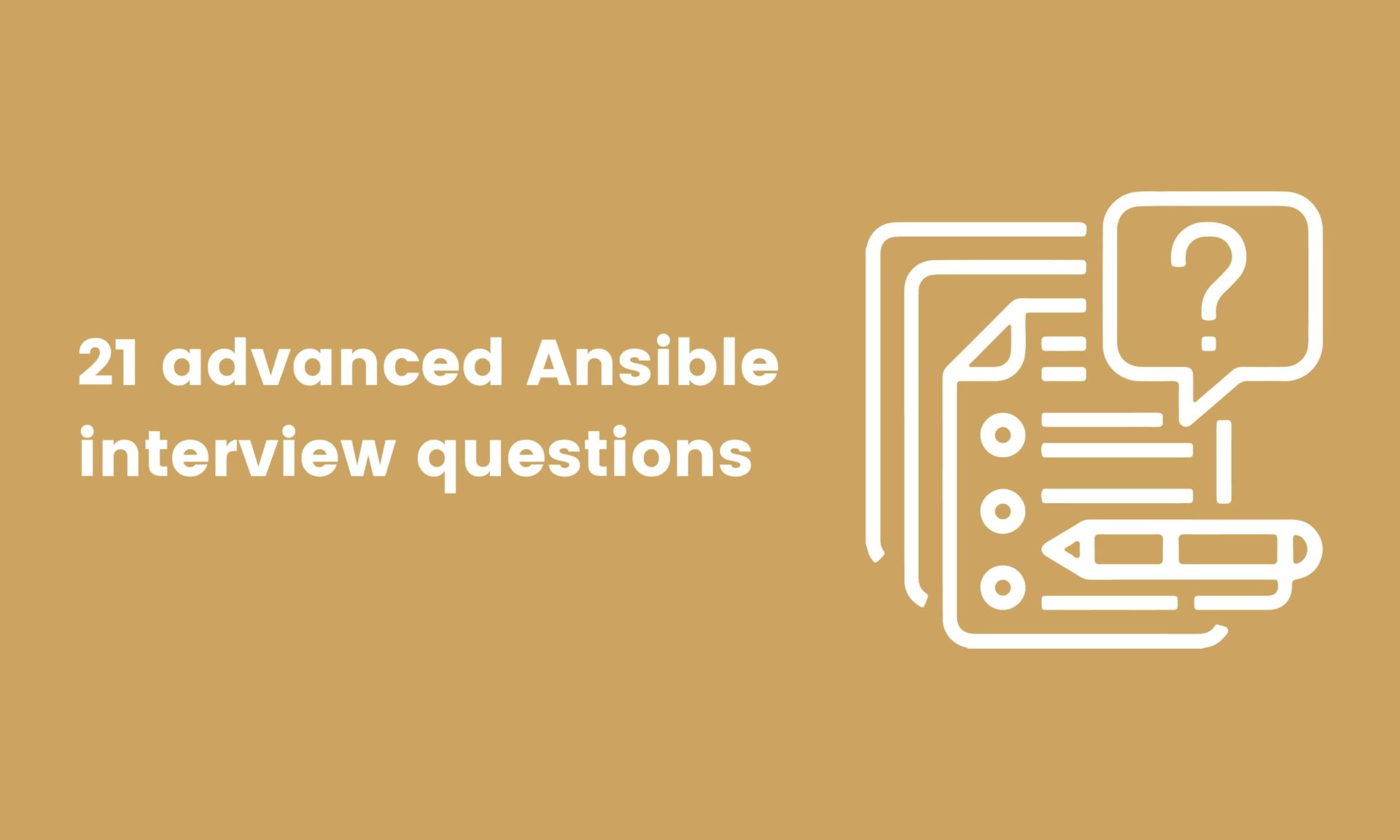61 Ansible interview questions to ask applicants
Your next site reliability engineer (SRE) or software developer with Ansible needs a number of skills to be successful, and assessing these skills is difficult.
What is the best way to ensure your next hire meets the requirements of your role? How can you be certain that your applicants have the right skill set and Ansible knowledge for your role?
Two methods you can use to evaluate applicants’ abilities are:
A skills assessment featuring an Ansible test
Interviewing applicants by using the right Ansible interview questions
Skill testing is simple: You just need to pick the right assessments from TestGorilla’s test library. Preparing your list of interview questions can be a bit more difficult.
That’s where this list of Ansible interview questions you’ll find in this article can help you. Build your list by using the questions below.
Table of contents
- 13 common Ansible interview questions
- 5 common Ansible interview questions and answers
- 14 basic Ansible interview questions
- 5 basic Ansible interview questions and answers
- 13 Ansible interview questions related to processes
- 5 Ansible interview questions and answers related to processes
- 21 advanced Ansible interview questions
- 5 advanced Ansible interview questions and answers
- At which stage of the hiring process should you use these Ansible interview questions?
- Find the best site reliability engineers and developers using the right Ansible interview questions
13 common Ansible interview questions
Ask site reliability engineers and software developers some of these 13 common Ansible interview questions to assess their skills and knowledge of how the Ansible IT automation engine functions.
Explain what Ansible is.
Outline three advantages of using Ansible.
Explain how Ansible functions.
Outline two technical skills site reliability engineers need to use Ansible.
Explain what Ansible Tower is.
Explain what Ansible Galaxy is.
Explain what Red Hat Ansible is.
Explain what Ansible Roles are.
Explain what Ansible Playbooks are.
Describe the Ansible architecture.
Explain what variable names are.
Explain what environment variables are.
Which skills do you hope to refine as a site reliability engineer with Ansible?
5 common Ansible interview questions and answers
Here are five common Ansible interview questions from the list above, along with sample answers you can use to review your applicants’ responses.
1. Which skills do you hope to refine as a site reliability engineer with Ansible?
Some of the crucial skills site reliability engineers may want to refine in their roles as site reliability engineers may include their technical knowledge of Docker containers alongside their Ansible and DevOps skills.
Are your applicants working to improve their abilities? Do they understand why these skills are important?
2. Outline three advantages of using Ansible.
Site reliability engineers or software developers who want to join your team should be aware of the many advantages of using Ansible. Here are some of the key advantages:
Site reliability engineers who use Ansible Playbooks don’t need unique coding skills
Site engineers can orchestrate the development of a whole application, regardless of where deployment occurs
With Ansible, it’s possible to model IT workflows no matter how complex they are
3. Explain what Ansible Tower is.
Applicants should be aware that Ansible Tower (formerly AWX) is a solution that facilitates the use of Ansible by functioning as a task automation hub.
Prospective employees should also know that they can use Ansible Tower for free until they reach 10 nodes.
4. Describe the Ansible architecture.
Your applicants should be able to explain that the main components of Ansible include:
APIs for commuting cloud services
Playbooks for task automation and seeing which tasks need executing
Modules, which are the output of scripts to manage packages and libraries
Plugins for transforming data and augmenting the functionality of Ansible
CMDB, which is a repository or a type of data warehouse
Inventories, which are nodes or hosts that contain databases and servers
5. Outline two technical skills site reliability engineers need to use Ansible.
Two technical skills that SRE applicants may mention when responding to this question include Sysadmin skills and DevOps knowledge.
Can your applicants explain why these skills are critical and give examples of how they have used them in their current roles?
The best insights on HR and recruitment, delivered to your inbox.
Biweekly updates. No spam. Unsubscribe any time.
14 basic Ansible interview questions
Find out whether junior developers or site reliability engineers have the right knowledge to succeed by asking them some of the following 14 basic Ansible interview questions.
Explain the difference between Ansible and Puppet.
Explain why site reliability engineers use Ansible.
Outline two soft skills site reliability engineers need to use Ansible.
Explain what CI/CD is and why it’s important for Ansible.
Explain whether site reliability engineers can build reusable content using Ansible.
Explain how variable names are different from environment variables.
Explain if it’s possible to manage the Windows Nano Server with Ansible.
Name five key Ansible Tower features.
Explain why it’s important to learn Ansible in SRE roles.
Is Ansible a configuration management tool?
Explain what Ansible vault is.
Explain what looping is in Ansible.
Explain what the ad-hoc command is in Ansible.
Explain what handlers are.
5 basic Ansible interview questions and answers
Below, you’ll find sample answers to five of the basic Ansible interview questions. Use them to assess whether your applicants’ knowledge is sufficient for your junior role.
1. Explain the difference between Ansible and Puppet.
There are a few key differences between Ansible and Puppet.
Candidates may explain that Ansible uses a YAML inventory while Puppet is written in Ruby. They may also explain that you can write Ansible modules in many languages that return JSON, including Ruby code or bash. In contrast, engineers need to understand the Puppet DSL to use Puppet.
2. Is Ansible a configuration management tool?
Can your applicants explain that Ansible is an open-source configuration management tool? Can they also explain that Ansible automates complex tasks and is used in multi-tier application environments?
3. Name five key Ansible Tower features.
Interviewees keen on joining your organization as site reliability engineers or software developers should be able to name five key Ansible Tower features, such as:
Tower CLI tool
Integrated Ansible notifications
A dashboard
Tower clusters
Playbook workflows
4. Outline two soft skills site reliability engineers need to use Ansible.
Can your interviewees name at least two fundamental soft skills for engineers that are necessary for their day-to-day work?
Examples of such soft skills include communication and problem-solving skills. The combination of the two enables employees to communicate with other team members and stakeholders, troubleshoot issues, and develop solutions.
5. Explain what looping is in Ansible.
Interviewees should know that looping in Ansible is a process engineers use to repeat tasks or code in Ansible Playbooks.
13 Ansible interview questions related to processes
Learn whether your interviewees are familiar with Ansible processes and are able to complete tasks in Ansible by asking them some of these 13 Ansible interview questions.
Explain how you would create empty files using Ansible.
Explain how you would set the environment variable for an entire Playbook.
Explain how you would access and change documentation in Ansible.
Explain how you would create encrypted files using Ansible.
Describe a situation when you would use Ansible tags.
Explain how you would filter tasks in tags.
Which approach would you use to upgrade Ansible?
Explain when you would use module utilities in Ansible.
Explain what core modules are for in Ansible.
Explain what extras modules are for in Ansible.
Explain how you would use encrypted files to automate password inputs.
Explain how you would carry out looping over a list of grouped hosts in a template.
Explain how you would make reusable content in Ansible.
5 Ansible interview questions and answers related to processes
Here are the suggested answers to five of the Ansible interview questions related to processes from the list above. Use them to gauge the thoroughness of your candidates’ responses.
1. Explain how you would create empty files using Ansible.
Can your interviewees explain that engineers use file modules and parameters to create empty files using Ansible? They should be able to explain that the two parameters include:
Path, which represents the location of file creation
State, which engineers use to create new files and should be set to touch
2. Explain how you would filter tasks in tags.
There are a couple of ways to filter tasks in tags. Site reliability engineers should know that they can use either –tags or –skip-tags, or TAGS_RUN and TAGS_SKIP in the Ansible configuration settings.
3. Which approach would you use to upgrade Ansible?
Can your applicants explain that using a command makes it easy to upgrade Ansible? Interviewees should know the correct command is sudo pip install Ansible==.
4. Explain how you would make reusable content in Ansible.
Applicants skilled in Ansible should know that roles are critical for making reusable content. They should be able to explain that conventions such as naming files and structuring directories can help site reliability engineers create roles and then use them to produce reusable content.
5. Explain how you would access and change documentation in Ansible.
Interviewees who wish to join your organization should know that they can access the documentation by going to the Git repository’s main project folder and clicking edit.
They can create a fork if they don’t have one, add a commit message, submit the required suggestions, click “Propose file change,” and then “Create pull request.”
21 advanced Ansible interview questions
Determine whether your senior-level applicants have the right Ansible knowledge and skills by asking them some of these 21 advanced Ansible interview questions.
How would you access Shell Environment Variables?
Which process would you use to make management faster in EC2?
Explain if it’s possible to use Docker modules in Ansible.
Explain how you would access an Ansible_Variables list.
Explain what idempotency means.
Explain what handlers are.
Explain the differences between Ansible and Chef.
Explain what Ansible Galaxy is.
Explain which programming language Ansible playbooks are written in.
Is Ansible open-source?
Explain the server requirements for Ansible.
Explain if it’s possible to connect to another device in Ansible.
Explain if site reliability engineers can create their modules with Ansible.
Explain what Fact means in Ansible.
Explain what ask_pass does in Ansible.
Explain what ask_sudo_pass does in Ansible.
Explain what ask_vault_pass does in Ansible.
Explain what callback_plugin does in Ansible.
How would you delegate tasks in Ansible?
Explain what Ansible Register is.
Explain how Ansible synchronizes module functions.
5 advanced Ansible interview questions and answers
Here are five advanced Ansible interview questions from the list above, along with sample answers to help you determine whether your applicants’ knowledge is aligned with the requirements of a senior-level role.
1. Explain which programming language is used to write Ansible Playbooks.
Skilled interviewees should be aware that site reliability engineers write Ansible Playbooks in YAML (Yet Another Markup Language).
2. Explain the server requirements for Ansible.
Can your interviewees explain that site reliability engineers need a virtual machine with Linux to use Ansible? Do they also know they need a version of Python higher than 2.6?
3. Explain if it’s possible to connect to another device in Ansible.
Knowledgeable applicants should know that site reliability engineers can use the Ping module to connect a different device in Ansible after creating an inventory.
4. Explain what ask_pass does in Ansible.
Senior-level candidates should know that ask–pass helps define whether the Ansible Playbook asks for a password by default. Applicants may also explain that when site reliability engineers use SSH keys, the ask_pass setting is not required.
5. How would you delegate tasks in Ansible?
Skilled interviewees should know that to delegate tasks in Ansible, they should use the delegate_to keyword for the required task. Do they know that managing nodes is also possible with the delegate_to keyword?
At which stage of the hiring process should you use these Ansible interview questions?
Use these Ansible interview questions in the last stages of the recruitment process once you have assessed applicants’ skills with the help of online skills tests.
Here’s the order you should follow:
Build a skills assessment featuring an Ansible test and send it to applicants
Use skills tests results to shortlist applicants for the interview
Use the Ansible interview questions listed in this article to evaluate the skills of your applicants more thoroughly
Make a hiring decision based on the results from the tests and the interviews
Find the best site reliability engineers and developers using the right Ansible interview questions
Hiring a skilled site reliability engineer or a software developer can be a complex task, so it’s important to consider ways to simplify the whole process.
Skill testing and interviewing are the two most important steps you can take to make hiring the right applicant easier.
When you’re ready to begin with the hiring process, use our Ansible test to evaluate candidates’ technical skills. Then, use the Ansible interview questions from this article to interview shortlisted applicants and gain an in-depth understanding of their skills.
Hiring the best talent doesn’t have to be complicated if you have the right tools in your toolbox! Get the TestGorilla free plan.
You've scrolled this far
Why not try TestGorilla for free, and see what happens when you put skills first.


















